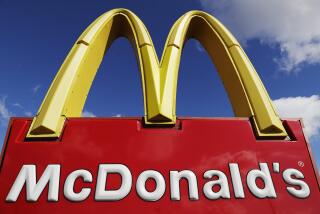Hard Times Feed Grocery Coupon Craze
- Share via
Americans are using cents-off coupons at a record pace, a new study says, as a weak economy causes more and more people to watch their grocery spending.
NCH Promotional Services, a Chicago-based marketing firm, said that for the first six months of 1992, coupon use swelled by 10%, saving consumers about $2.3 billion on cereal, detergent, coffee and dozens of other household items.
If the pace continues, NCH said, consumers will save $4.7 billion with coupons this year, a record.
Analysts say coupon users are pocketing real savings because overall grocery prices haven’t risen much. In the past, some manufacturers used coupons to soften the blow of price increases.
Consumers are saving at the expense of grocery chains, many of which double or even triple the value of coupons to attract shoppers.
Douglas Christopher, a supermarket analyst with Crowell Weeden in Los Angeles, said the rise in coupon usage is no doubt pushing up costs at a time when supermarket sales are flat.
GETTING A MAKE-OVER:
Some companies are trying to boost sales in a recession by finding new uses for stodgy, old products.
H. J. Heinz Co. is bringing out Cleaning Vinegar, a special formulation of regular vinegar to use on dirty glass and tile. And Clorox is test marketing Household Bleach, a mixture of soap and bleach for cleaning bathrooms and kitchens.
These manufacturers are betting consumers will give the products a try because the brand name is so familiar. What’s more, manufacturers say, the spinoff products are suited to the way consumers use the originals. For example, Clorox said many of its customers use bleach to disinfect toilets and sinks.
Besides reworking old formulas, manufacturers have also tinkered with the price. A half-gallon of Household Bleach costs $1.49, 50% more than Clorox bleach.
NOT QUITE READY TO COMPOST:
Northwest Metal Products Co. says protecting the earth is the “right thing to do,” so it offers two products labeled as biodegradable. What are they? Trash cans and watering cans made of galvanized steel.
A company executive said the cans sold throughout California will rust and rot away if buried in the earth “just like an old car body,” a process that could take 20 years.
That doesn’t quite meet California’s legal definition. According to Deputy Atty. Gen. Albert Sheldon, a biodegradable product must return to its “natural state” a year after it is thrown away.
Northwest Metal said it is changing its labels to alter the biodegradable claim.
“Our point was to compare our products to plastics, which take hundreds of years to break down,” explained Vice President Clair Couturier. “But we’ve decided degradable is a better word.”
SKUNKED:
An Idaho man is proposing to cut down on crime by making it more odious.
John D. Haley, a landscaper-turned-entrepreneur, is marketing what he considers to be the ultimate self-defense weapon: skunk essence. Haley instructs women to wear or carry a vial of the substance. When pinched, the vials release a cloud of malodorous skunk scent, presumably strong enough to ward off an attacker.
Haley says that his small Boise company, Mephitis Inc., has sold 300 vials so far, mostly through mail order. He demonstrated the product for the Boise Police Department several months ago; officers who inhaled suffered daylong headaches.
“It made me uncomfortable,” said Capt. Larry Paulson, a detective who investigates violent crimes. “But I don’t know if it would stop someone.”
Haley said the scent wears off in four to seven days, but people who use the vials don’t have to wait that long. The kit contains a chemical used by veterinarians that will neutralize the scent.
More to Read
Inside the business of entertainment
The Wide Shot brings you news, analysis and insights on everything from streaming wars to production — and what it all means for the future.
You may occasionally receive promotional content from the Los Angeles Times.










